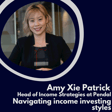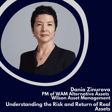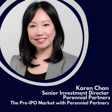Introduction and Podcast Mission
00:00:07
Speaker
Welcome to the Alpha Females Invest Podcast, two females working in finance, searching for Alpha. My name's Emily. And my name is Clooney. And together we bring diversified perspectives from the buy and sell side of the finance world. Now, Em, before we kick off our very first podcast today, I think we should give our listeners a little bit of background as to why we decided to start this podcast.
00:00:31
Speaker
From my perspective, I think there are a lot of driven, capable, interested, yet pretty uninformed investors in the market. And as such, I think there's a bit of a gap in terms of the knowledge of taking your financial and investing knowledge to the next level. I don't want to give away all our ideas for hot topics of conversation on day one, but I definitely think there is a large time out there that would like to grow their market knowledge beyond just having a portfolio.
Defining 'Alpha' in Investing
00:00:56
Speaker
adding alpha in diversified ways, understanding the use of structured products such as derivatives, and discussing themes that are gaining traction and likely to have a large impact on market positioning and sentiment going forward. Not to even mention the prospects of investing globally, the benefits and discounts of running a passive versus active strategy, and the increased popularity around ETFs and seeing how global investment banks interact with industry funds to drive alpha worldwide.
00:01:24
Speaker
Now to the name, the alpha females. Don't be mistaken, Clooney and I are pretty big personalities, but that's not the type of alpha that we're referring to here. I assume that most of our listeners understand alpha as a financial concept, but let me give you a quick 101.
00:01:40
Speaker
Alpha is a term used in investing to describe an investment strategy's ability to beat the market. Alpha is used in finance as a measure of performance, indicating when a strategy, trader or portfolio manager has been able to beat the market return. The excess return on an investment relative to the return of a benchmark's index is the investment alpha.
00:02:01
Speaker
So we hope that this podcast will add alpha to all of our listeners' investment journeys.
Episode Topic: Tech-based Investing
00:02:07
Speaker
And I also just wanted to do a quick shout out to TMYK Music. You can find him on Instagram. He is the producer of our intro and outro song. So thanks, Tom. So today on our very first episode, we thought, why not start topical? And what seems to be pretty topical, rightly or wrongly, amongst the millennial investing cohort,
00:02:26
Speaker
is tech. Tech the big word. Most of my friends seem to think tech is the only way to invest quite frankly. So today I think we need to make sure we really understand the concept of tech-based investing, the benefits of it, and whether or not we're in a tech bubble.
00:02:41
Speaker
So with that we'd like to introduce you to Elise Kennedy who is the head of technology research at Jardim and she's been in the financial markets for quite a long time although doesn't look it and most recently she was a award-winning tech analyst at Morgan Stanley covering the TMT sector and also gaming.
00:03:01
Speaker
What's even more interesting about Elise is actually in the past she was an Elise swimmer and holds her pilot's license. So still waiting for my invite on the plane. But also she hosts her very own podcast as well called Talking Tech with Elise. And we're so excited to have you on that episode today.
00:03:18
Speaker
Thanks for having me on the show, girls. We're very excited. Maybe we'll get a free trip out of this M. I hope so.
Understanding Tech Companies and Market Dynamics
00:03:25
Speaker
Now, before we start each episode, we like to kick it off with a question or two to make all our superstars on the show feel a little bit more relatable. So, Elise, can you tell us, what's your most embarrassing career moment?
00:03:37
Speaker
Oh look, I tend to, Clooney, take a lot of those embarrassing career moments in my stride and often it's not as embarrassing as I tend to think it is at the time. So one of the examples I can give is my first stock initiation. So the report was released, I was relaxing over in Bali and this headline came out in the AFR saying Company X Reports Categorically Incorrect Report.
00:04:01
Speaker
I was freaked out, that was my report. I thought, oh no, client's reactions, losing my job, all those worst case scenarios. Logged onto my email, here's the cruncher. Much to my surprise, I had positive reactions from clients. They all wanted a copy of the report. They thought, hey, there's something that's got to be insightful in that. And then also the firm, knowing they had strong rig around compliance, backed me. So all in all, it was probably a pretty positive kickstart to my career.
00:04:28
Speaker
How good's a positive, embarrassing story? I'm sure a few of mine are definitely not positive stories with a good ending. No, love that. So let's take a step back and can you tell us how do you even define a tech company? What are the types of signs and signals that we can look to identify a tech company on the ASX?
00:04:45
Speaker
Look, I feel like every single company wants to be called a tech company to justify a high evaluation. I recently read an article about a salad chain calling itself a tech company. Hey, it takes a lot to put salad together. If you need protein, that's another additive, you know, not to mention tofu these days. There you go, 20 times EV sales right there.
00:05:05
Speaker
So the S&P ASX is one way that you can go and define what an all-tech index is by a formal definition, and that can look at some of the stocks in the landscape. But it's important to note, when looking at that, not all those stocks are created equal. Just because it's classified as technology doesn't mean that it's high growth and it should be valued on that salad chain multiple that you want to put it on there, Clooney.
00:05:28
Speaker
The stocks index are actually very different in terms of their revenue profile and their operating models. And investors have to note that when they are comparing some of those multiples. So given all that and given, I guess, sort of, you know, the average investor looks to tech stocks and thinks that's a tech stock, how do you then determine what is really a successful tech company versus what isn't?
00:05:49
Speaker
There's a couple of things that I look for, particularly I look for capital-like models, large addressable markets, market leadership, and you can see that from market share gains, sticky customers, you can see that from low churn numbers, the ability to scale in an economic manner as well, and you can tell that by the cost of acquisition or CAC as we call it in the tech land, and also lifetime value, also known as LTV.
00:06:13
Speaker
Now there must be some pretty good benefits of being a tech analyst. Do you get any free samples? I'm not sure how envious my friends would be if I told them I got a counting software or, you know, printing circuit board software. But look, what I do love about being a tech analyst is some of the stories, like those that you hear about a coder in the garage who decided to drop out of uni and start a business and it ends up being an ASX 50 company.
00:06:38
Speaker
For me, I like to think as well, you're able to then give back to those friends and families that might start up their own business and they're helping to shape them for the listed market in time.
Are We in a Tech Bubble?
00:06:49
Speaker
So tell us, are we in a tech bubble? Well, according to macroeconomists, we've been in a tech bubble and an equity bubble since I started my career back before 2014. And just so you know, the market since then is up well over 35%. So that's a pretty big bubble.
00:07:07
Speaker
Well, it hasn't popped yet, I think is the important part in there. Look, I think there are yield rate movements and inflation trends, which do weigh on the macro side, but I think long-term, it's important to think about these high-growth companies and the structural changes that are occurring. Those are underlying fundamentals that aren't going to change, that yes, you may see some better entry points from the macro environment, but these tech companies will continue to grow and see their earnings grow that'll help justify higher share prices.
00:07:34
Speaker
Do you find entry points a real significant component for your clients? Is that something they really take into consideration? Or if they plan on holding it over the longer term, is it less of a consideration when they enter a position?
00:07:46
Speaker
It really depends on the fund that you're looking at. If you've got some of your shorter-term traders that are looking for opportunistic entries and exit points, then that's a real driver of it. But if you're looking more at your long-term fundamental, which is a lot of the superannuation money that we have in Australia, they're more fundamental long-term investors who will be thinking that five years that they're willing to hold and or buy in those less opportunistic moments because they know long-term it will grow.
00:08:12
Speaker
Yeah, great. And so obviously the tech sector in Australia has had a pretty good run. So it started off as about 0.5% of the index, and it's now eightfold of that. It's had a little bit of a hit to the share prices lately. I guess, how does the tech crash of 2001 compared to what we're seeing at the moment? Is there more to go? It's a great question. I'll say I'm not old enough to know.
00:08:35
Speaker
But one fundamental underlying difference is we have actual well-established profitable companies here versus that dot-com bubble where we had a lot of speculative companies. They had no track record of profits then and they were kind of in that minimum variable product stage, which you see more in VC land today.
00:08:53
Speaker
So, a lot of the companies today, they are moving into new markets, which means that they are in heavy investment phase, but they might be profitable, say, in one country. For example, you can look at Xero, it's got profitability in Australia and they've been here a long time, but again, it hasn't got the margins, perhaps, of a more mature company because it's still growing. So, I think that that's an important differentiator in today versus when we had that dot-com bubble.
00:09:18
Speaker
So given those differences, I guess, and given the sort of factor rotation that Em mentioned we've seen in the market currently,
00:09:25
Speaker
Are you seeing your clients or people sitting on the sidelines of techs or are you seeing them getting right back involved? And sort of do you think tech will continue to underperform or continue steady in this value rotation that we're seeing across the board? I think we've already started to see some signs of what could happen in a rotation outside of tech and more towards value. I think perhaps, yes, we could see
Valuations and Economic Shifts in Tech
00:09:48
Speaker
some more softness because they are
00:09:52
Speaker
impacted most by the yield and rate environment. However, again, I go back to those underlying earnings and once that market starts to stabilise, at the end of the day, again, that structural shift should drive them and have structural tailwinds to support that valuation longer term.
00:10:07
Speaker
I hear a lot of investors, retail investors on social media saying, it's the yield curve, it's rates, that's why tech's down. Why is that actually important for tech companies? It's a great question. It goes a bit to the way that you model the companies. When you don't have profits, the way that you approach valuation tends to be your DCF or discounted cash flow.
00:10:29
Speaker
And that model, one of the big things that drives the outcome of that is one, your end of year value, which can be about 70% of what the worth of that business is, because again, that's where the most of your earnings start to come through. And two, this is the important part around what that rate is doing. Effectively, that is what you discount those cash flows back at. And so the higher that rate, the lower the valuation. Yep, classic DCF whack analysis.
00:10:56
Speaker
And is that just on the DCF for those that are not so modeling aware? Is that something you have to update constantly or do you constantly keep an eye on it? When do you think bond yields are up? I've got to pull the trigger and change my DCF. It's a great question.
00:11:11
Speaker
I think that for us, you will have a meaningful 1% move, and there is the futures curve that change regularly. But remember, whilst you are changing that one key variable of an interest rate, you're also having other drivers on a fundamental level. Again, what I mean by that is higher earnings or better economics of the business that, again, it tends to net off that you can often still see a rising share price, which is the important point to note, even if that yield rate does go higher.
00:11:41
Speaker
Yeah, that's really interesting.
00:11:42
Speaker
You've kind of touched on a little bit on the importance of a DCF, but how should we think about valuing an unprofitable company that might have really top strong sales growth, but really at the underlying level, they're still burning cash, they're not profitable yet? So again, yeah, you can do the DCF approach, but there's some other elements that you can start to look in there. So you can start with the, what is the addressable market? How and what percentage share might they capture of that? And that can give you a rough sales estimate, and then you can put on a multiple
00:12:11
Speaker
of that. Management's a key component as well when looking at can they execute on getting that market share and what is the competitive landscape and their dynamics that are at play there. Maybe we should put this podcast on 20 times sales and I'd buy it. So just in the space more generally, what are you seeing from your perspective? Are you seeing a lot more IPOs come through the market? Are you seeing competition intensifying? Could you just give us a bit of a view on how you're seeing the market at this point in time?
00:12:41
Speaker
I feel like COVID has accelerated our structural shift online and that's created the opportunity for new entrants to come into the market. But it's important to note that it's this stage, the tech companies have this large, huge addressable market. So whenever you hear about these competitive names and you hear it a lot in the buy now, pay later space, do you think, well, actually there's a huge runway for growth in this space. So I think that's an important thing. Bit of the pie for everyone.
00:13:05
Speaker
Exactly, Clooney, that's it. So I think that, you know, rather than think this is a monopolistic environment, remember that, one, there's a term, two, we've seen healthy oligopolistic environments, and that's an important thing to think about when you are thinking about profitability and competition.
Insights into the Unlisted Tech Market
00:13:23
Speaker
that's great. And obviously, the listed market is one component of the tech market, but it's not the entire story. We've got a really large unlisted market for tech companies. And we also have an IPO pipeline. I mean, on the ASX, majority of the companies that have listed have been either healthcare or tech. So it's a really booming sector for capital raises and IPOs. Can you talk through how investors can get some insight into the unlisted market?
00:13:49
Speaker
It's a great question and part of the reason we started a startup tech podcast, Talking Tech with Elise, myself, here at John. And I've been listening to it all week. Everyone get on, it's a great episode a week. Thanks Clooney and Emily for that.
00:14:04
Speaker
That's where we do host listed and unlisted high growth companies, venture funds, entrepreneurs, and we talk about what's happening in that tech space and it's on Spotify, it's on the App Store, but what's important and why are we doing that is a lot of firstly our listed holders, you want to know what your future disruptors are. So whether or not you want to play and can play in that space, you want to know
00:14:24
Speaker
through the journey, what have these companies been doing? Where are they headed? What is it potentially going to disrupt something that I'm holding today? And it's better to know the company earlier before they come to market, because then you've seen their transformation journey, you've seen them execution strategy, and you feel more comfortable when they do come to market in backing them. So talking about that journey of an unlisted company, because often they're not profitable. So when does it get to the point where you think this company should be listed on the ASX?
00:14:53
Speaker
So I think a company, when it can show it's got a sustainable competitive advantage and the ability to penetrate into an identified addressable market in an economically sustainable manner, that that's a way to be able to say, hey, here's a clear runway for growth and here's a sustainable way that I can start to model it. As I mentioned before, management are also a key part of the analysis too. How much skin do they have in the game? Can they articulate their vision? Have they got a solid track record on executing?
00:15:21
Speaker
Those are all those important attributes that even if they haven't got earnings, you feel as though I can identify how and see a pathway to executing on that. Yeah, it's great. And it's really interesting. I guess listing on the market also allows you to get a market valuation, so what people think your company is worth. And we hear a lot of founders or CEOs of listed companies say it's really elevated their profile, their company profile as well.
00:15:46
Speaker
So I guess, do you think that investors in the tech space in Australia are kind of in it for the long haul or are they really kind of just trading volatility? It's a really mixed bunch and it depends again what type of fund that you're speaking to and whether it's domestic, whether it's international, whether it's got a short term mandate or a long term one.
Comparing Australian and US Tech Markets
00:16:06
Speaker
So with tech valuations so high, there's plenty of hedge fund traders looking to trade on short term volatility and misses and they'll get a lot of options on that. But again on the flip side,
00:16:16
Speaker
you've got a lot of these stocks that are about the long term and investors are thinking about that five to 10 year space and what is going to still be profitable and most profitable then. And then they're willing to look through that unprofitability. So again, it goes back to depending on which client that you've got.
00:16:32
Speaker
And what are some of the differences that you think are between the US and Australian tech market? What are you seeing overseas that might come here or what are the key differences and where is Australia going? Where's the next leg of growth? Well, it's interesting. I think the Australian market has and will continue to go a long way in terms of the number
00:16:50
Speaker
of tech companies. We've seen some fantastic companies that have come out of Australia and New Zealand that are listed today. So I think today we have a bit of a scarcity premium is what we call it in Australian market where we tend to trade on higher multiples for our tech names that have that higher growth. Whereas you go over to the US doing a road chill and they'll bring out a spreadsheet of all these other companies and say, hey, I can invest in all these. Whereas you come here, it's a bit of a smaller cohort.
00:17:17
Speaker
So that, I think, will probably exist for a number of years. But I do see, as we've discussed, a huge number of exciting companies coming through the unlisted space that are going to be profitable, going to be disruptive, going to really move the dial in our market that I think we will become closer to that market distribution of different listed stocks over the next, say, five to 10 years.
Career Advice and Closing Remarks
00:17:42
Speaker
Great, well that pretty much wraps up our technical questions but we do have one final question we want to end on and hopefully we can end all of our podcasts on this note. But can you give the listeners and I guess us, we need some help. We need great help. What is your top career tip and what can people learn from your journey?
00:18:00
Speaker
I don't think you girls need this tip, but look, I say to anyone, you've got to back yourself. We all have doubts. There is this term that they say about imposter syndrome whereby a lot of us, particularly females, feel as though you're faking it each day. And it stops us from rising to those positions that we actually are capable of. So today, even if I don't feel confident, I just say yes.
00:18:22
Speaker
And I let the business then decide if I am or I'm not capable of the task or the opportunity. So I feel as though if we did everything that we already know how to do, we'll remain stagnant. So it's a way to grow, get our potential. So at the key,
00:18:38
Speaker
thing is back yourself and just say yes. Perfect. So just say yes to listening to this podcast and keep listening. Thanks so much for joining us, Elise, and thank you to everyone who's listening. We hope we have added some alpha to your investment knowledge today. Thanks. That was Elise Kennedy from Jardin, an absolute weapon analyst. So thanks for joining us. Thank you, Clooney. Thank you, Emily.




















